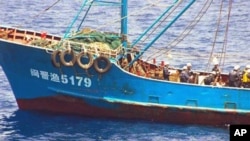China is demanding that Japan immediately free the captain of a fishing boat, whose crew was released and flown home earlier Monday following a tense diplomatic standoff between Beijing and Tokyo.
But Japanese police continue to hold the boat's captain, Zhan Qixiong, while investigators decide if he should be charged with deliberately striking a patrol ship and obstructing public officers. Under Japanese law, he can be held for 20 days without charge.
His fishing boat collided last Tuesday with two Japanese coast guard ships near a group of tiny uninhabited islands in the East China Sea that both China and Japan claim.
China has summoned Japan's ambassador to China Uichiro Niwa four times to protest the fishing boat detentions, most recently very early Sunday.
Beijing warned Tokyo Sunday against making what it describes as misjudgments over the incident. China wants Zhan released immediately.
The disputes threatens to harm trade and economic ties says Liu Jiangyong, an expert on China-Japan relations at Tsinghua University in Beijing. If Tokyo does not acquiesce to Beijing demands to halt the investigation, Liu says, the dispute could escalate.
China, which routinely rebuffs all criticism of its legal proceedings as interference in its domestic affairs, says that Japanese is holding the captain illegally.
The dispute over the islands, which China calls the Diaoyu and Japan calls the Senkaku, is at the heart of the incident. Japan controls the islands and the rich fishing waters around them, but China says they are part of its territory. Large, untapped gas and oil fields are believed to lie beneath the sea floor around the islands. Both countries are keen to control the resources.
Relations between Beijing and Tokyo have long been distrustful, although the two are major trading partners.
Much Chinese bitterness stems from Japan's occupation of a large part of the country before and during the Second World War. The Japanese, on the other hand, are wary of China's territorial and military ambitions in Asia.
Large public protests in China against Japan in 2005 and 2006 led the countries to try to improve ties. There are fears, however, that the territorial scramble in the East China Sea could undermine that effort.




